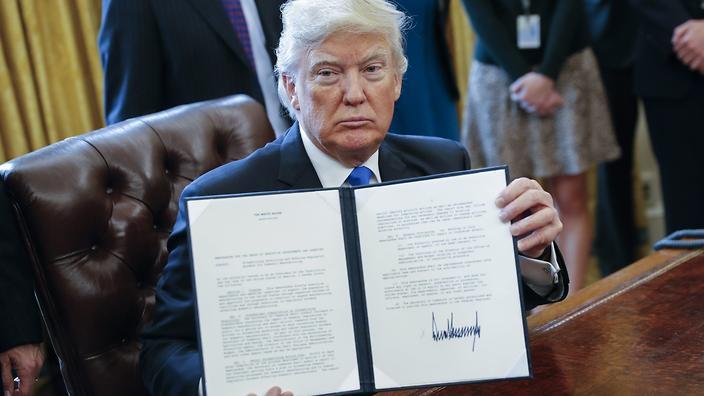
RNA - In breach of international protocols and the nuclear deal signed between Iran and the P5+1 (the United States, Britain, France, Russia, China and Germany), Washington says President Donald Trump intends to impose new sanctions on Iran over its recent missile test, insisting “nothing is off the table in responding to Iran.”
This follows comments by several administration officials threatening action against Iran, which might include military action. Details of the new sanctions are still scant, and officials say nothing is final until Trump actually signs it. They do, however, insist the new sanctions would be of the form already in effect and will not violate the P5+1 nuclear deal.
This could be yet another policy measure taken against Iran by Trump, less than a week after his shameful executive order to ban Muslims, including Iranian nationals, from travelling to the United States. The Iran sanctions rule, first implemented by Reagan, has been repeatedly reinstated by subsequent Democratic and Republican administrations, then reinforced whenever a new president moves into the White House.
But that doesn’t mean there is anything routine about Trump’s gambit to bring the anti-Iran sanctions rule back. In fact, given what we know so far about the Trump team’s foreign-policy agenda, the new sanctions move fits a pattern of testing attacks on Iran that can then be imposed on other sovereign states across the globe that are not in good terms with war-party Washington.
For instance, the Obama administration did just that with Russia over Ukraine. True, the Treasury Department has just announced a change in policy towards US technology sales to Russia. But that doesn’t mean Trump is already loosening the reins on the Kremlin. Quite the contrary, those with experience in “foreign compliance” know full well that the change is just a quick fix that allows US technology companies to sell normal, non-sanctioned information technology products to Russia, such as software and some encrypted hardware, like cellphones.
Into the argument, Trump’s version of anti-Iran sanctions rule has gone further than previous version by expanding the travel ban to all Iranian nationals, potentially affecting as many as one million Iranian-American citizens and their families. This is important, because Iranians have traditionally built a sizable community in the United States. The diaspora might start emigrating from the United States and take hundreds of billions of dollars of assets out of the country. This is much likely to happen if the current Muslim ban is extended after the three-month period stated in the executive order.
It’s not just the travel ban and sanctions where the United States deploys its most inhumane policy experiments against a sovereign nation; the worst abuses of Washington’s hegemonic power have always taken place in the Middle East. The use of terror proxy forces to achieve brutal regime change has been on for decades. It was, after all, the expansion of regime change campaign from Afghanistan to Iraq, Libya, Syria and Yemen that helped trigger the current global refugee crisis.
Trump is now inaugurating a full-scale revival of anti-Iran sanctions and Islamophobia campaign with promises for more terror wars in the heartlands of the Muslim world. During his campaign, against all evidence, he promised a zero-tolerance toward Muslims and immigrants, as well as scorched-earth policy of terror fighting redolent of the worst excesses of the 2000s War on Terror. In another bleak parallel between Bush’s and Obama’s foreign policy, the terror war could soon be revived and re-exported across the globe, with Trump threatening to send troops to target more “terrorists” in the Middle East.
One of the most obvious attacks on international human rights - with severe implications for refugees and immigrants - can be seen in Trump’s antagonism against Muslims, the United Nations and other basic international legal frameworks. If the Real War on Terror by Iran, Iraq, Syria, Russia and Hezbollah collapses, guess what: For all its exceptionalism, the United States is still part of the Middle East. The countries most vulnerable to this foreign policy blunder will be those in Western Europe and the US itself.
Like Obama, however, Trump seems bent on using Iran as laboratory for oppression across the globe, undermining International Law, shuttering the border, and incrementally shredding the UN Charter. For a nation that projects an image of itself as a leader in promoting human rights, it’s a direct attack on International Humanitarian Law. To this end, Trump will lie in a way that’s uniquely his own. He will pretend his administration is trying to send a diplomatic message to clarify that the new sanctions aren’t meant to be punitive on the average Iranians. “The sanction is a result of bad behavior on the part of the Islamic establishment,” he will claim, “not a blind retaliatory measure against the whole of the Iranian nation.”
The international civil society should be unsettled, because things come apart so easily when they have been held together with lies and arrogance. This is the same man that turns a “get-to-know-you” phone call with a longtime ally into an international incident, a White Supremacist “birther” whose cabinet appointees have been justifiably criticized for displaying racism and discrimination against their own citizenry and insufficient sympathy for Muslim refugees and immigrants.
847/940